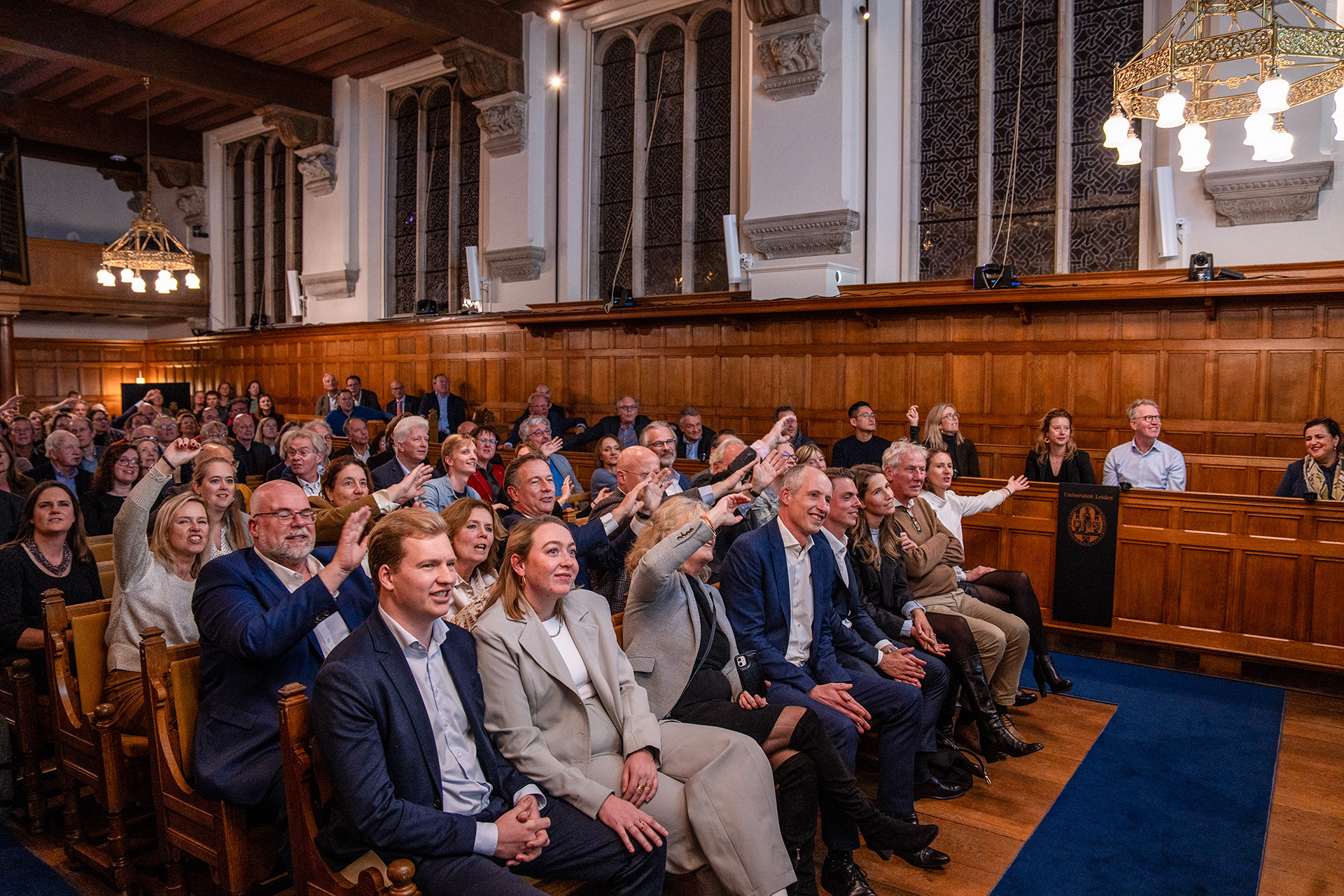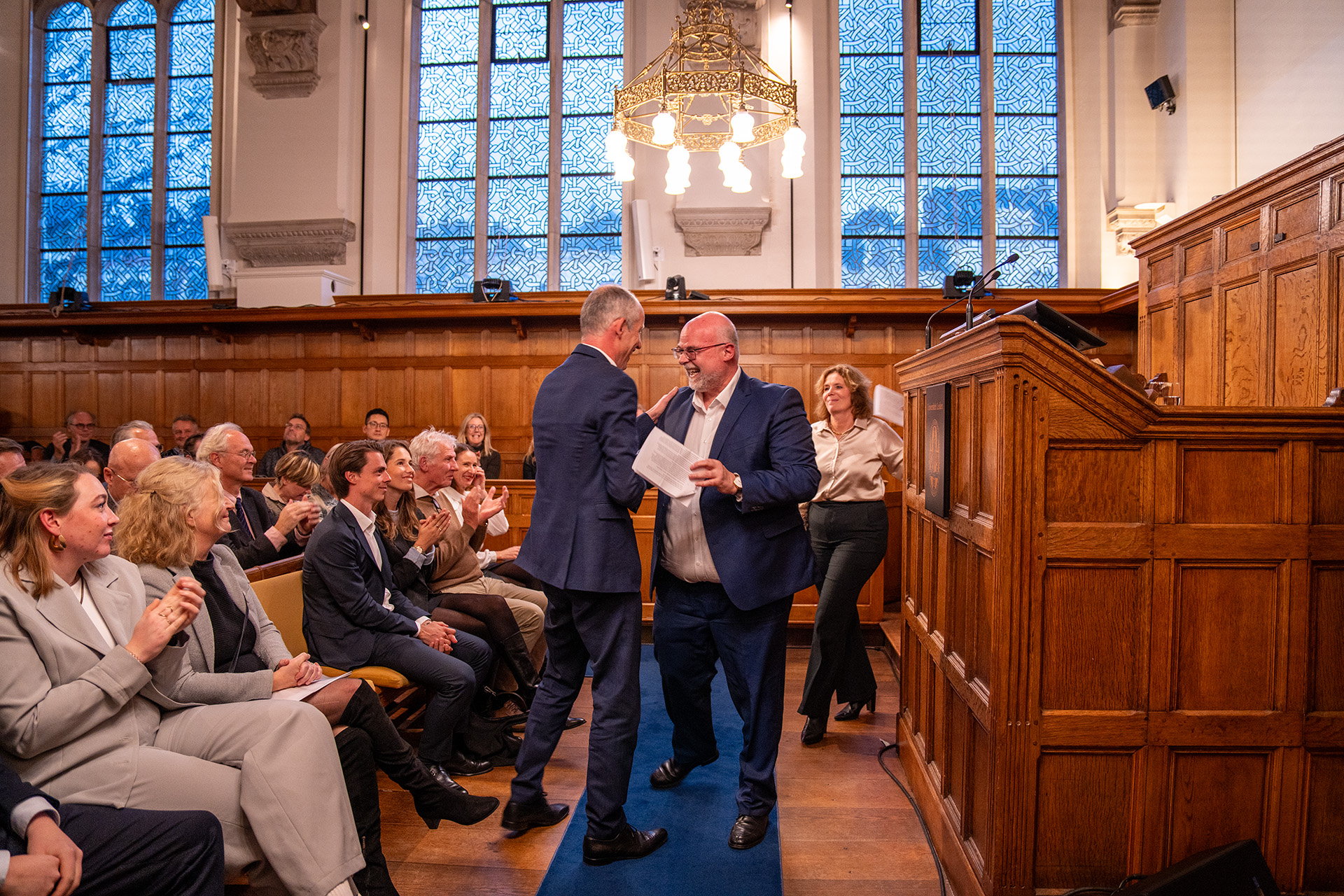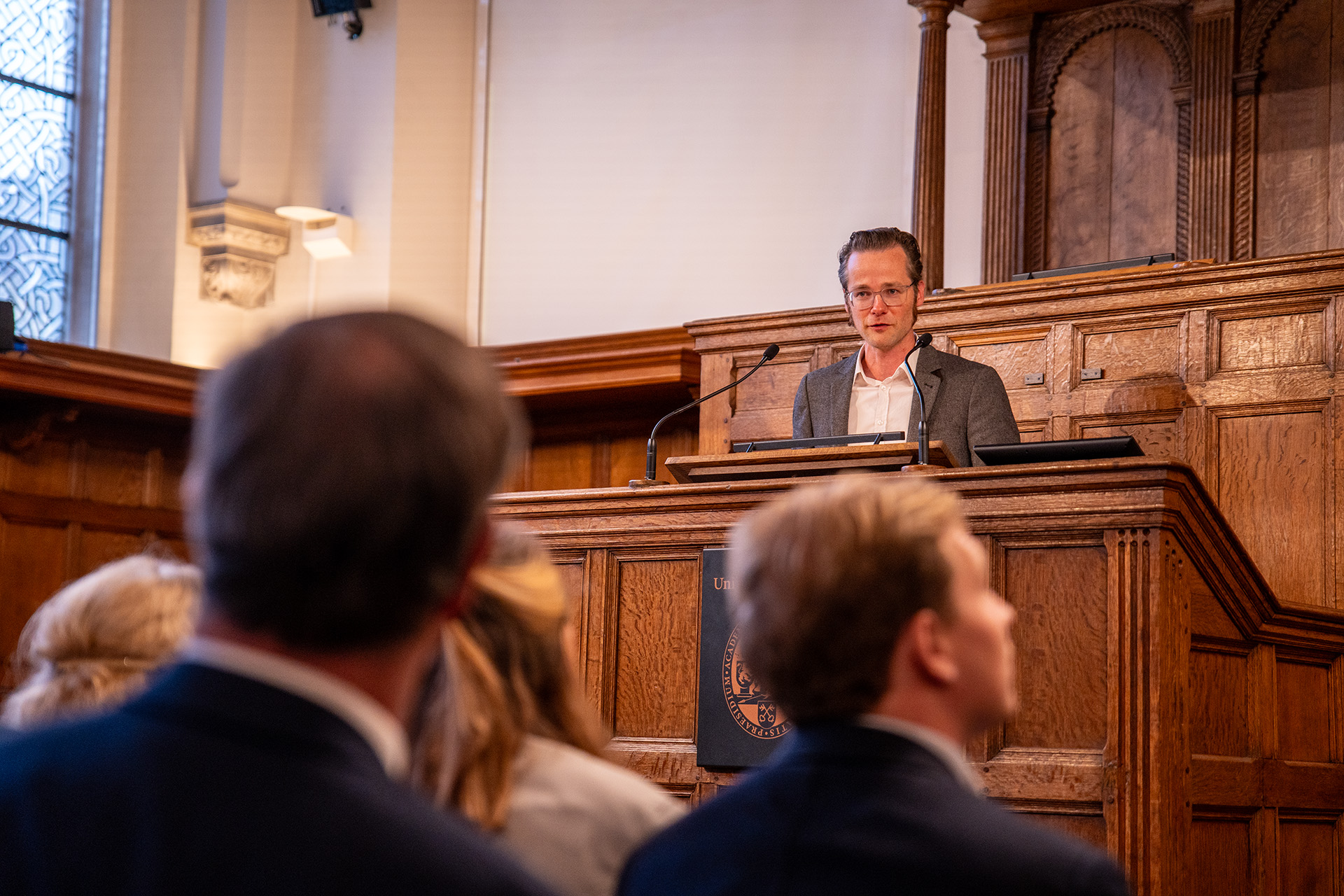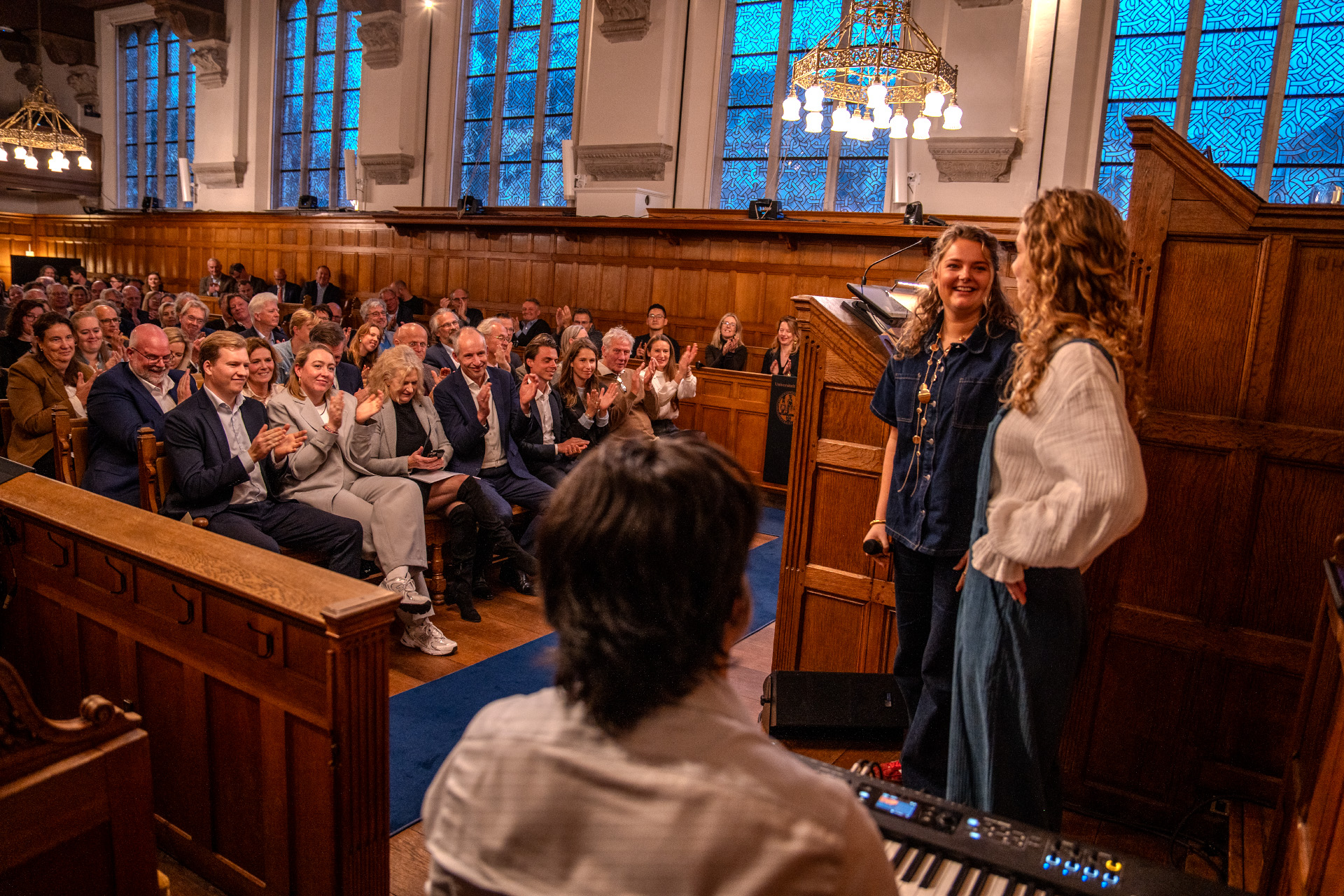
Farewell to Martijn Ridderbos: ‘We can’t do it alone’
In his leaving interview, Martijn Ridderbos doesn’t have to think long when asked what he is most proud of. ‘Bringing people together; creating things together. Reducing the gap between researchers and the staff who support them because the latter are essential. We’ve achieved that and the seeds have been planted but there’s still work to be done.’
Martijn Ridderbos (1969) became Vice-Chairman of the Leiden University Executive Board in 2017 and has served the maximum possible term in the role bar a few months. He will join the board of the Netherlands Authority for Consumers and Markets (ACM) on 1 January 2025. It was difficult at times but his main memories are fond ones. But he is worried about the university’s future. Any tips for his successor? ‘Try to enjoy your work as much as I have. That’s essential to this job.’
New leadership
Ridderbos did not have much experience as a university leader when he came to Leiden in 2017. He found a compartmentalised organisation where people talked about but were less likely to talk with each other. ‘I made integrality my focus, literally getting people together at the table. We now have new directors – staff from outside but also staff who have come up through the ranks – for nearly all the portfolios I’m responsible for: Finance, Real Estate, ICT and research infrastructure, HRM and facilities. They want that collaboration just as much as I do.
‘And they are not the only onew. It has to be about the collective rather than the individual. We may work at a department or institute but we serve the entire university. That is what I mean by new leadership.’
Proud
Ridderbos can list many things he and his colleagues have achieved but for him, that collaboration remains the essence. ‘We have built fantastic buildings together but it all comes down to connection. In this case the connection with the users of such buildings. You can only solve big issues like ICT, real estate and the like through the collective. You need each other for that, and trust is the basis.’
He looks back on the collaboration with the city from that same perspective. ‘We have a good relationship with the municipalities of Leiden and The Hague, which also helps.’
Ridderbos is also proud of how the university continued to operate during the Covid lockdowns. ‘We rolled out Office 365, including Teams, in one weekend, something we had set aside two years for. And after closing for two weeks, we largely had our online teaching up and running. It was a stressful but special time. This was only possible because colleagues from so many different faculties, departments and services worked together. That made me more convinced that we had to move towards collectivity.’
Photos of Martijn Ridderbos’s farewell reception
-

A stray tear and a lot of laughter at Martijn Ridderbos's farewell reception -

Words of praise for the Vice-Chairman of the Executive Board -

Vice-rector Erwin Muller thanked Ridderbos -

The other two Executive Board members donned aprons for their speech -

University historian Pieter Slaman -

Not forgetting Ridderbos' guilty pleasure ABBA
Headaches
It wasn’t all rainbows and unicorns; there were headaches too. He found the framing of the cameras hung up to count people in the buildings during and after Covid ‘terrible’. ‘Those things could do more but that functionality was disabled. But despite improvements and lots of discussion they were not accepted by the community and were removed. I learned that we need to have privacy and security in order and that the communication beforehand could have been better.’
Silos
He is realistic about how quickly change happens at the university. ‘I realise it has been a small shift. I have planted some seeds. I had to fight against the silos that have snuck into our organisation. Sometimes excellence is literally in the way. The individual is still central to academia, with most prizes and appreciation still going to a few people. That gives the wrong impetus. Let’s not forget who we are doing it for – our students and society – and that we are doing it together.’
And the society our university belongs to has become more complex. ‘Look at the polarisation we see today, also at the university, among students and staff. You see it everywhere, in politics too. We are opposite rather than next to each other, which does not help.’
Hard choices
Ridderbos also sees a difference in approach between the university and the world around it. ‘A university is based on knowledge, facts and objective data. For us, it’s about truth, discussion, debate and connection. But politics nowadays can be based on lies. These are difficult times and things are getting harder. The cuts announced by a government that does not prioritise education and knowledge generation mean that we as a university will have hard choices to make. We will not be able to carry on doing all the things we would like to do.’
Respect each other
What would he like to say to his colleagues now he is leaving? ‘Try to bridge the gap between colleagues – from different departments and different “blood groups” – and help and respect each other. If times become hard, taking it out on each other will not help the university. We desperately need each other. Contact with others is essential. I also wish the whole organisation a bit more peace and quiet. We get too caught up in the day-to-day.’
He will definitely miss Leiden. ‘It’s like a village at times but I that compactness is the city’s strength. I’m also looking forward to doing something new. But I hope to be at the Dies Natalis in February, at the kick-off to the 450th anniversary: we mustn’t forget to celebrate things like that. I’ll stay in touch with this wonderful university whatever happens.’
New challenge
Martijn Ridderbos begins a new challenge on 1 January 2025 as a member of the board of the Netherlands Authority for Consumers and Markets (ACM). His farewell reception was on 18 November and his last working day is on 28 November.

Farewell reception: ‘See others as your equal and work together towards a goal’
Students singing Abba songs, warm and fitting words from colleagues, a cook’s apron signed by many and a photo exhibition about collaboration between researchers and support staff The forces behind the faces: it was Martijn Ridderbos’s farewell reception on 18 November.
The common theme was the connection Martijn had brought about. ‘We should stop using the term support and administrative staff’, one speaker said. ‘We are professional colleagues and that’s all there is to it.’
The speakers included university historian Peter Slaman – who emphasised how relatively fewer support staff have taken on more tasks since the 1950s – Fleur Spijker (alderman for education at the Municipality of Leiden), duos Erwin Muller & Karin van den Elzen and Chris Suijker & Saskia Goedhard – who like Fleur Spijker mentioned how Martijn prefers personal interaction in the form of phone calls or apps – Rolf Oosterloo and bringing up the rear Annetje Ottow and Hester Bijl.
The two remaining Executive Board members appeared last and joked about Martijn’s many roles. ‘Martijn has many qualities and has been important to us in all his different roles. He served as a counterweight, helping avoid potential blind spots. We are truly grateful to him.’
This was followed by three students – Julia Luyt, Bo Nieuwenhuis en Max Kuitems – singing Abba songs, Martijn’s guilty pleasure. Alongside cooking and running his ultimate relaxation is ‘reading a comic book on the sofa with Abba blaring out of the speakers’.
Martijn spoke about how the wheels at the university often turn very slowly and how he hoped to have got the institution moving now and then, or at least ‘swaying’. His advice to staff? ‘Let’s show how agile we are. That takes courage and daring. See others as your equal and work together towards a goal.’
He concluded that none of this would have been possible without love, ‘because there’s no life without love’. Visibly moved, he thanked his wife Hilda and three children Lise, Jip and Puk (and their partners) for their support.
Then all that remained was to reveal his leaving gift, a project at Leiden University that is close to his heart: promoting literacy and helping children enjoy reading. Over 3,500 euros have been raised and this is rising all the time. Donations are still welcome.
Text: Caroline van Overbeeke
